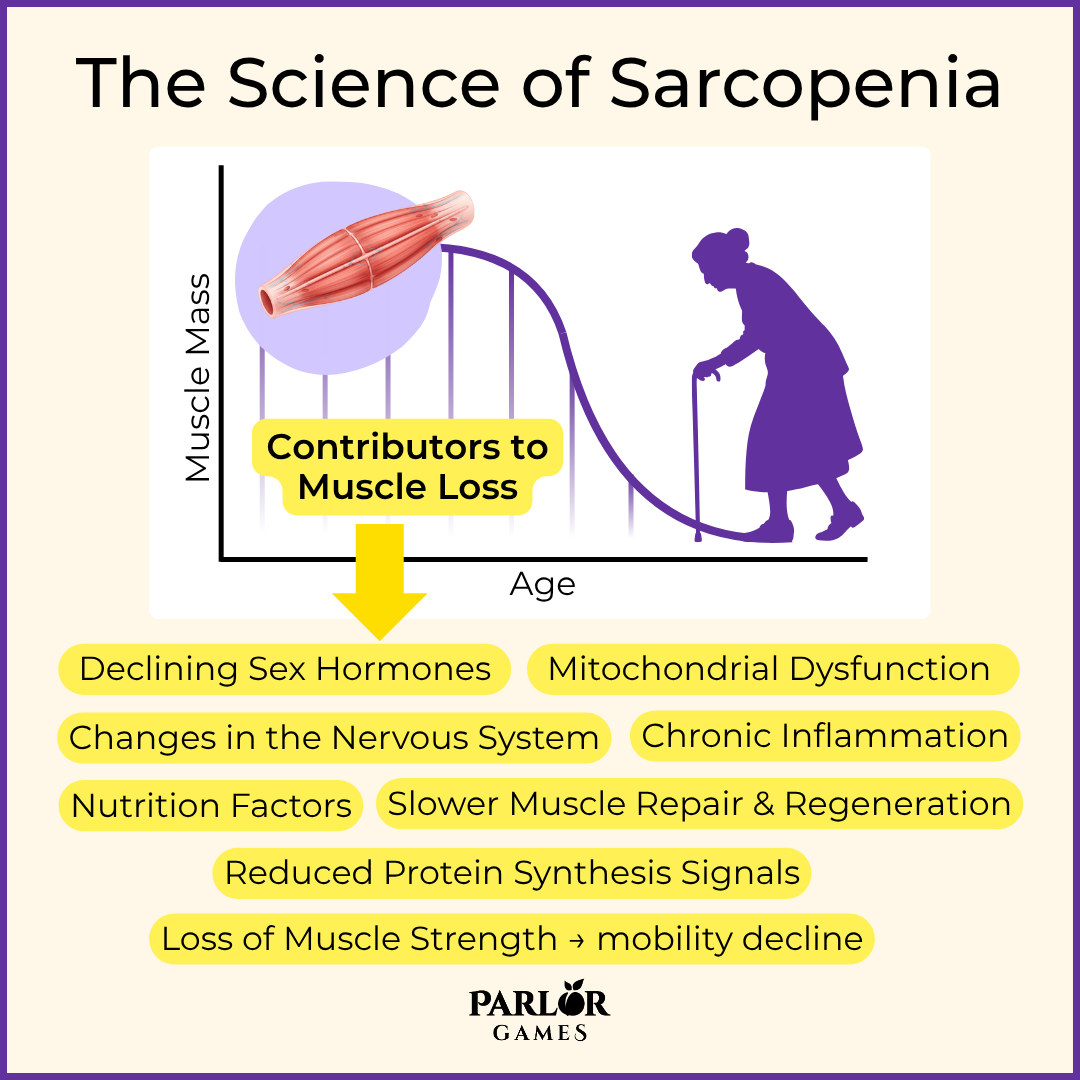LAST DAY TO SAVE 10%* - Coupon BFCM2024
*Excludes BioNude, subscriptions, hormone tests and health coaching

Sarcopenia is the slow, sneaky loss of muscle that creeps in with age. It doesn’t just make you weaker - it affects balance, metabolism, and even confidence. While exercise and protein are the classic remedies, hormones play a big behind-the-scenes role, too.
A 2021 review in Frontiers in Medicine examined how declining sex hormones - including DHEA (dehydroepiandrosterone), estrogen, testosterone, and progesterone - contribute to sarcopenia, the progressive loss of muscle mass and strength that comes with aging.
Sarcopenia isn’t just about skipping workouts. It’s a complex, multi-factor condition tied to changes in the nervous system, inflammation, mitochondrial function, nutrition, and, critically, hormonal decline. The review highlights that sex-steroid hormones directly influence muscle metabolism, repair, and regeneration.
Muscle cells have receptors for both androgens (like testosterone) and estrogens. When hormone levels fall, the signals that tell muscle fibers to grow and repair weaken. This disrupts protein synthesis pathways essential for building and maintaining lean mass. The result: slower recovery, reduced strength, and eventually loss of mobility and independence.
DHEA serves as a precursor hormone, converted by tissues into active estrogens and androgens. The review notes that DHEA appears to support mitochondrial energy function and regulate inflammation inside muscle cells, but evidence remains limited compared to testosterone and estrogen studies. Some small trials suggest that DHEA replacement can modestly improve muscle function when paired with exercise, but results are inconsistent.
The authors emphasize that no hormone therapy (including DHEA) is currently approved for treating sarcopenia. While hormonal support may hold promise, exercise, adequate protein, and sufficient sleep remain the foundation of prevention. The paper calls for large, controlled clinical trials to define who benefits, what doses are safe, and how best to combine hormones with lifestyle interventions.
According to this Frontiers review, hormonal decline - especially loss of DHEA and other sex steroids -plays a meaningful but partial role in muscle aging. Restoring balance may help, but hormones should be viewed as part of a bigger picture that includes training, nutrition, and recovery.

Lorem ipsum dolor sit amet, consectetur adipiscing elit.
Lorem ipsum dolor sit amet, consectetur adipiscing elit.
Lorem ipsum dolor sit amet, consectetur adipiscing elit.
Lorem ipsum dolor sit amet, consectetur adipiscing elit.
Disclaimer: The information provided above is intended for educational and informational purposes only. Statements made have not been evaluated by the FDA nor are they intended to treat or diagnose. Any health concerns should be discussed and evaluated by your primary health care provider.
Parlor Games, LLC ● kate@parlor-games.com ● 5304 River Rd N Ste B ● Keizer OR 97303
Disclaimer: The information provided above is intended for educational and informational purposes only. Statements made have not been evaluated by the FDA nor are they intended to treat or diagnose. Any health concerns should be discussed and evaluated by your primary health care provider.
28 Day Challenge Subscription Details

We ship you a 28 day supply of Silky Peach Cream for only $29 (more than 25% off our normal price) when you sign up for Subscribe & Save.
Follow the directions we include in the package and apply Silky Peach cream on your tender bits for 28 days.

Decision Day:
5 days before your subscription rebills, we’ll send you an email reminder with a link. If you decide Silky Peach is nice but not your thing… you can click that link and cancel your subscription without even talking to anyone. No hassle — no questions asked.
If you are like 72% of our Silky Peach customers, you’ll love it and can't imagine life without it. In that case, do nothing, and we’ll welcome you to the Parlor Games family and ship Silky Peach Cream to your door step every month for the same discounted price of $29 — locked in for as long as you remain a subscriber.

Important note about our easy-breezy subscriptions:
We know that some companies make it hard to cancel a subscription — that’s not us. Our mission is to save the world — one vagina at a time! If you decide you don’t need Estriol as an ongoing solution for dryness, incontinence, UTIs and keeping sex fun and comfortable again, we understand. Five days before we ship your next order, you'll receive an email with a link to cancel right there in the message.
No hunting, no searching, we got you. Respect is where it’s at.
FYI – Estriol is beneficial for skin integrity and mucous membranes. It’s great for vaginal atrophy and also amazing for use on the face and neck. Applying a small amount — about 1 pump — can help build the collagen and plump up the cells to reduce wrinkles. Who knew!!
OUR HAPPINESS GUARANTEE
We want you to feel safe and confident trying any of our products. That's why we promise 100% money-back guarantee on the purchase price of the first bottle of any of our products. Balancing hormones DOES take some time, so please try it for 28 days. If after 28 days you are unhappy, or the product just hasn't worked for you, simply contact us and we'll process a refund of your full purchase price upon receipt. Sorry, shipping fees are not refundable.